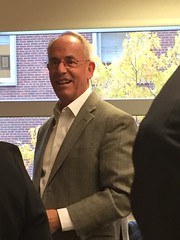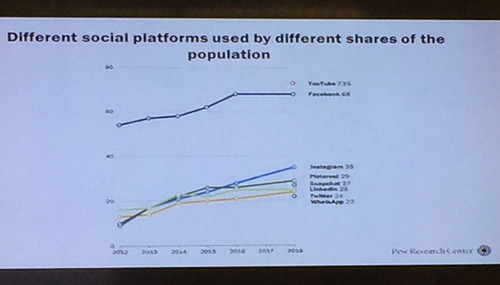 Last week, Lee Rainie - director, internet and technology, Pew Research Center - spoke several times at Syracuse University, including two public talks. On Oct. 31, Rainie spoke on "Trust, Facts and Democracy: What the public is thinking in these tense times" (#TullyCenterRainie) and on Nov. 1 he spoke on the "Reckoning of Technology Companies." As always, Rainie came loaded with facts, graphics, and stories.
Last week, Lee Rainie - director, internet and technology, Pew Research Center - spoke several times at Syracuse University, including two public talks. On Oct. 31, Rainie spoke on "Trust, Facts and Democracy: What the public is thinking in these tense times" (#TullyCenterRainie) and on Nov. 1 he spoke on the "Reckoning of Technology Companies." As always, Rainie came loaded with facts, graphics, and stories.There is much that I could write about what Rainie said, however, I encourage you to look at the research on the Pew website under "Internet & Technology". There you will find publications, presentations, datasets and more. What I do want to focus this post on is Rainie's response to a specific question.
Lee Rainie has been a frequent speaker at library conferences. With that in mind, I asked him a generic question about "access to information" and encourage him to take that question in any direction he wished. Rainie listed off several things (not necessarily in order of importance):
- People are turning to their mobile devices first for information. Some of that information is being delivered with a geographic context to it. In other words, you are receiving was is important to you in the geographic spot you're in.
- People are relying on alerts to inform them of what is going on. Alerts are a big part of the systems we're now using. Relying on alerts means that people are doing less browsing.
- This is a rise in app usage (which goes along with the two points above), which also means that people trust apps. Trust was something Rainie returned to again and again in his presentations.
- People are engaging in multi-screen experiences. This might mean watching the news on one screen, for example, while surfing/searching on another in an effort to make sense of what is happening ("meaning making").
- We're engaging in synthesized media experiences, which means that what we are receiving is being synthesized by someone or something. "Someone" else is curating for us and deciding what we will see.
- We are interacting with technology more by voice (voice interfaces).
- Print books - and to some extent print journals - have had a staying power that we did not anticipate. We assumed that digital books (ebooks) would become dominant, but that has not been the case.
My apologies for not having a clearer image of this slide.

No comments:
Post a Comment